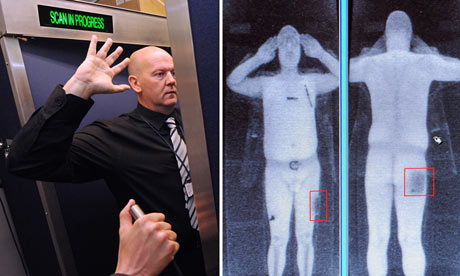TRENTON, N.J. – The use of full-body scanners at airports should be reconsidered because the machines are ineffective, are overly intrusive and open the door to further invasions of privacy depending on how the images are retained, state lawmakers said Monday as they announced a resolution urging Congress to review the program.
“We’re not talking about eliminating security; we’re talking about using security wisely,” said Assemblywoman Valerie Vanieri Huttle, a Democrat from Bergen County.
The effort brought together members of both political parties and both houses of the state Legislature as well as the American Civil Liberties Union. The resolution calls the scans a “gross violation” of the Fourth Amendment right against unreasonable search and seizure and says the machines’ effectiveness has not been sufficiently proven.
More than 300 of the machines are in use at dozens of airports around the country. Newark began operating its first machine last month. The scanner creates a detailed computerized image of a person’s body and gives screeners the ability to check for weapons or other prohibited items.
Travelers who decline to go through the scanner are subjected to a pat-down that the lawmakers said involves the touching of genital areas.
“If it occurred in another setting, somebody would be going to jail,” Sen. Michael Doherty, a Republican from Hunterdon County, said.
An incident involving a body scanner at San Diego’s Lindbergh Field over the weekend became an Internet sensation after a software engineer posted a cell phone audio recording of the encounter.
On NBC’s “Today” show Monday, TSA head John Pistole said the agency is looking for a balance between security and privacy. A TSA spokeswoman didn’t immediately comment on the New Jersey resolution Monday.
Among other concerns the lawmakers raised was the potential health risks of radiation exposure to small children, pregnant women and people who fly frequently.
They also cautioned about the use of images produced by the scanners, particularly those of children. The images are supposed to stay in the machine, ACLU executive director Deborah Jacobs said, but could create legal issues if they were transferred to a server where they could be viewed by more people.
Doherty admitted that the opposition to the new security measures may be a sign that post-Sept. 11 attitudes toward personal privacy are changing.
“I think we gave the government the benefit of the doubt,” Doherty said. “But what’s to stop them from doing this kind of thing on buses or trains, or at shopping malls? Where does it end?”
By DAVID PORTER, Associated Press David Porter, Associated Press – Mon Nov 15, 5:15 pm ET
Source: AP
See also:
– German Protesters Strip Down In Airport To Protest Full-Body Scanners
– World’s largest pilot union shuns full-body scanners, warning cites radiation risk
– TSA: 500 Full Body Scanners By The End of the Year, 2,000 Planned
– Pilot to TSA: ‘No Groping Me and No Naked Photos’
– The Full Body Scanner Invasion; New Scanners Break Child Porn Laws
– US prisoners forced to submit to radiation experiments for private foreign companies
– Full-Body Scanners Emitting ‘High-Energy’ Radiation Increase Cancer Risk
– TSA lies exposed: Full-body scanners do save and transmit images, secret documents reveal
– Israeli Airport Security Expert: Full-Body Scanners Are Waste of Money
